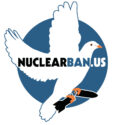Nobel Committee:
[The 2017 Nobel Peace Prize is awarded to the International Campaign to Abolish Nuclear Weapons] for its work to draw attention to the catastrophic humanitarian consequences of any use of nuclear weapons and for its ground-breaking efforts to achieve a treaty-based prohibition of such weapons.Beatrice Fihn, ICAN’s Executive Director:
Bea is a 34-year-old Swedish visionary. Here is her interview with the New York Times Magazine, November 1, 2017.
Congratulations on your Nobel Peace Prize! How did you become interested in nuclear disarmament? I’ve always been interested in international issues. But as with many people who grew up after the Cold War, nuclear weapons didn’t feel relevant. I interned for a Swedish feminist peace organization called Women’s International League for Peace and Freedom in Geneva. I got thrown into these big U.N. meetings where Russia and the U.S. and China debated nuclear weapons, and I was completely fascinated because it was so bizarre.
How so? Nuclear weapons just don’t make any sense! They’re sitting there with their papers talking about these crazy weapons that can end us all, and no one said: “This is crazy! What are we doing?” I was fascinated by the power dynamics, and I just got hooked.
Many countries banned chemical weapons and land mines for being inhumane. Why haven’t we done the same for nuclear weapons? That’s the thing; we give them this exception to all sanity or reason. We have the Geneva Conventions that say that you can’t indiscriminately target civilians, but that’s just what nuclear weapons are designed to do. Nuclear bombs are a very old-fashioned weapon. And if you consider the kind of threats we’re facing today — climate change, organized crime, food security, that kind of stuff — you can’t fight terrorism with a nuclear bomb.
So how do you do this work, day to day? Lots of emails, mostly. Talking to people. We have more than 460 organizations that are a part of this campaign network. Some are activists, some are connected to politicians and work to lobby parliaments, plus everything in between. It’s basically trying to raise awareness of this issue.
What is the aim of the treaty on the prohibition of nuclear weapons that the U.N. adopted in July? There’s always been this idea that we need to get rid of nuclear arms that even leaders of the nuclear-arms states have sort of supported. For instance, Obama won the Nobel Peace Prize partly for his Prague speech against them. But we have allowed it to continue and have this exception to laws and norms. With the treaty, we wanted to push an agreement. We hope that it will help countries make other choices. We saw, for example, with the Land Mines Treaty, that the United States or Russia or China didn’t sign it, but they change their policies and behaviors. This treaty creates a norm that nuclear weapons are bad.
In a time of so many profound worries, why should we prioritize nuclear disarmament? This is an issue that could be an easy fix. It could be quite easy to make decisions to just reduce them or take them off alert status and reprioritize our militaries. We could use that money for other things. We have the power to do it. People think nuclear weapons are like a natural disaster or an asteroid hitting Earth, because the consequences are so awful. But we need to see them as just weapons; we can control them. They’re just really giant, expensive, dirty bombs that could end us all. We built them; we can take them apart.
Are there ways to change people’s minds about nuclear bombs? We have to keep talking about the humanitarian impacts of what would happen if you use them. We get a glimpse of it when we talk about North Korea, but we don’t think about how American nuclear weapons are aimed right now. They can be launched within 20 minutes. If the U.S. nuclear arsenal all went off, it could kill civilization, and Donald Trump has the ultimate authority to do that, as commander in chief. But if you’re really uncomfortable with Trump having that power, you are really uncomfortable with nuclear weapons in general. There are no right hands for these weapons. There’s no one who should have that kind of power.
Michael Douglas, actor, UN Messenger of Peace:
I supported [ICAN’s] dream, but had my doubts about their plan. Turns out, they were right.
We are lucky to have a new generation take up this fight.
